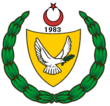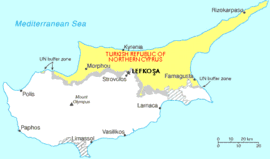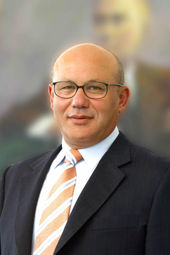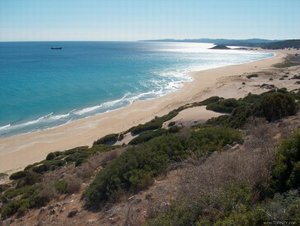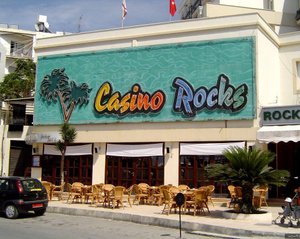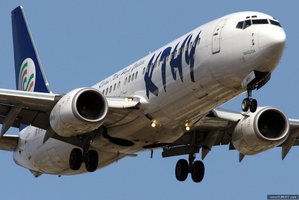|
CYPRUS
|
||||||||||||||||||||||||||||||||||||||||||||||||
|
The Turkish Republic of Northern Cyprus (TRNC) (Turkish: Kuzey Kıbrıs Türk Cumhuriyeti) is a breakaway de facto state unilaterally proclaimed in the northern third of the island of Cyprus in 1983, nine years after the Greek Cypriot coup d'etat led by EOKA-B and supported by Greek military junta of 1967-1974 and the ensuing Turkish invasion of Cyprus. Its predecessor from 1975 to 1983 was the Turkish Federative State of North Cyprus.
Turkey is currently the only country that recognises the TRNC (however the Organization of the Islamic Conference has recently taken steps towards recognition of TRNC), while all other governments and the United Nations recognise only the de jure sovereignty of the Republic of Cyprus over the whole island. Although TRNC institutions are not recognised internationally, the President-elect of the TRNC is recognised as the negotiatinig representative of the Turkish Cypriot community. TRNC has applied to the Commonwealth Games Federation to take part in the Commonwealth Games as a separate team to Cyprus, but this has currently been rejected.
The TRNC has a population of about 200,000 and an area of 3,355 square kilometres (including the tiny enclave of Kokkina (Turkish: Erenköy). Its population is almost entirely Turkish-speaking ethnic Turks, and consists of two main communities: indigenous Turkish Cypriots and migrant Anatolian Turks. Many of the older Turkish Cypriots speak and understand Greek - some may even be considered native speakers of the Greek Cypriot dialect. There are also tiny populations of enclaved Greek Cypriots and Maronites.
The TRNC includes the northern part of the city of Nicosia (Turkish: Lefkoşa, Greek: Lefkosia), which serves as its capital. A large share of the people living in northern Cyprus after the Turkish invasion have emigrated, particularly to Western Europe but also to Turkey and have subsequently been replaced by settlers from Turkey. They felt obliged to leave the island due to the tight economic embargoes imposed by the Republic of Cyprus.
From the tip of the Karpass Peninsula (Cape Apostolos Andreas) in the northeast, the TRNC extends westward to Morphou Bay and Cape Kormakitis (the Kokkina/Erenköy exclave marks the westernmost extent of the TRNC), and southward to the village of Akıncılar. The territory between the TRNC and the remainder of Cyprus is separated by a United Nations-controlled buffer zone.
History1960 - Establishment of the Republic of Cyprus
The Republic of Cyprus was established after the island gained independence from the United Kingdom. The ethnically Greek and Turkish communities living on the island were given full participation in governing the new Republic. Both groups were allocated seats in the government chambers and positions in the civil service. The Constitution of the Republic provided that 70% of the members of the House of Representatives would be Greek-Cypriots and 30% Turkish-Cypriots. For some matters, like the budget, for example, separate majorities were required. In the army and the civil service, the ratio had to be 60-40 respectively. Greece, Turkey, and the UK became guarantor powers of the Republic under the 1960 Treaty of Guarantee.
1963 - Inter-communal fighting and constitutional collapse
In December 1963, the government of Cyprus collapsed after a 3-year stall in legislation as a result of the constant inability of the two communities to reach decisions. Tensions increased when Makarios proposed thirteen amendments to the constitution of the Republic of Cyprus. Turkish Cypriots were opposed to the proposal since it relegated their status to a minority, instead of co-founders of the state, whilst also removing their communitys constitutional safeguards. These amendments were largely seen as a move towards Enosis (union with Greece) by Turkish Cypriots. On 21 December 1963, clashes between Turkish Cypriots and Polycarpos Yorgadjis (the Interior Minister) plainclothes special constables left two Turkish Cypriots and one Greek Cypriot policeman dead [1]. Although the ensuing violence led to attacks launched by both communities, Turkish Cypriots had born the brunt of the offensive, leading to 700 Turkish Cypriot hostages being taken and full scale attacks launched by Nicos Sampson against the Turkish Cypriot population [2].
The fighting left 191 Turkish and 133 Greek Cypriots dead and 209 Turks and 41 Greeks missing [3]. Widespread looting of Turkish Cypriot villages led to twenty thousand refugees retreating into armed enclaves which remained for 11 years, relying on food and medical supplies from Turkey to survive. Though much of the initial withdrawal was in the wake of violence, the Turkish Cypriot own paramilitary group exercised influence in preventing some Turkish Cypriots returning to their villages, thus leading to the segregation of the communities.
Mehmet Ali Talat President of the Turkish Republic of Northern Cyprus
In 1967, Turkey and Greece came close to war during the Kokkina/Erenköy incident when attempts by the local Turkish commander to expand control of the Agios Theodoros and Kofinou enclave into the main road route passing through the area prompted a National Guard attack to restore the status quo ante.
Enclaves
According to Brigadier Francis Henn, former Chief of Staff, UN Force in Cyprus, the Turkish Cypriots were "besieged" and "56,000 members of the community had been deprived [by the Greek Cypriots authorities] of their normal means of subsistence".
1974 - Greek and Turkish military actions
In July 1974, the Greek military junta of 1967-1974 backed a Greek Cypriot military coup d'état in Cyprus. President Makarios was removed from office and Nikos Sampson, a former EOKA fighter and a member of Parliament, took over the presidency. Using the coup as a pretext, Turkey invaded Cyprus, claiming that it was a necessary intervention to protect the Turkish Cypriot populace according to the 1960 Treaty of Guarantee.
Beach in Northern Cyprus
The coup promptly failed and Makarios returned to power. Turkish forces proceeded to take over about 37% of the island, ethnically cleansing the occupied areas of their Greek Cypriot population. In total, over 195,000 Greek Cypriots fled to the south of the island while 75,000 Turkish Cypriots moved north.
1975 - From federation to independence
In 1975, the "Turkish Federated State of North Cyprus" was declared as a first step to international recognition of a Turkish Cypriot separatist state in Cyprus. The move was rejected by the Republic of Cyprus, by the UN and by the international community. After eight years of failed negotiations with the leadership of the Greek Cypriot Community, the north declared its independence in 1983 under the name of the Turkish Republic of Northern Cyprus. The UDI of the TRNC was rejected by the UN and the Republic of Cyprus.
Reference Brigadier Francis Henn,A Business of Some Heat - the UN force in Cyprus before and during the 1974 Turkish invasion, Pen & Sword Books 2004.
Politics
Note: The status of the TRNC is disputed. It is not recognised by the international community except Turkey, and, as such, the terms associated with politics (President, Prime Minister, elections, government, parliament) remain controversial when used in relations to the TRNC (see Cyprus dispute). However, the Turkish Cypriot authorities are internationally recognised - including Turkey as the representatives of the Turkish Cypriot community and negotiate on its behalf.
Its electoral system has a president elected for a five-year term. Its legislature is the House of Representatives (Temsilciler Meclisi), which has 50 members elected by proportional representation from five electoral districts. In the elections of February 2005, the Republican Turkish Party, which favours a peace settlement and the reunification of Cyprus, retained its position as the largest parliamentary party, but failed to win an overall majority.
Although casinos are illegal in the Republic of Cyprus one can find several in the TRNC
Economy
The TRNCs economy is 70% service based customs, tourism, university, trade incomes economy. The Turkish Cypriot economy grew 15.4% (ranking 3rd in the world) in 2004, but remains a relatively poor country due to the embargo imposed by the southern Republic of Cyprus. Per capita GDP has increased dramatically over the past few years:
The Turkish Cypriots are heavily dependent on monetary transfers from the Turkish government. Under the 2003-06 economic protocol, Ankara plans to provide around $550 million to the TRNC. Approximately 300,000 tourists had visited North Cyprus last year.
International status
The international community - with the exception of Turkey - does not recognize the TRNC as a sovereign nation (Note: the Nakhichevan Autonomous Republic, an exclave of Azerbaijan, does regard the TRNC as sovereign, while the rest of Azerbaijan officially has not followed suit). The Organization of the Islamic Conference gives the TRNC the status of a constituent state, and it is an observer member of this organization.
Since the April 2004 referendum on the United Nations Annan Plan, the attitude of the international community towards the TRNC has begun to improve. Günter Verheugen, the EU's Enlargement Commissioner, was reported as saying that the EU was considering opening a representative office in the TRNC. EU foreign ministers agreed to give the TRNC 259 million euros (US$307 million) in aid, but the blocking of the aid by the Greek Cypriot Administration resulted in the decision being postponed, and half of the money to be lost.
Legally, however, the European Union continues to consider northern Cyprus as EU territory with a disputed foreign military presence and thus indefinitely exempt from EU legislation until a settlement has been reached. While certain outlying regions of the EU can and do obtain exemptions from EU law, Northern Cyprus is the only part of the Union where such laws are not enforceable. The number of seats assigned to Cyprus in the European Parliament (six seats) is based on the population of the entire island. By comparison, Malta, with a population equal to that of the government-controlled southern part of Cyprus, holds 5 Members of the European Parliament (MEPs) seats. Despite the fact that the Turkis Cypriot residents of Northern Cyprus - and possibly some of the naturalized Anatolian Turks - are EU citizens, fewer than expected Northerners voted in the 2004 elections. There is no support for admitting two Cypriot member states into the EU.
Communications and transport
Because of its status and especially due to the trade embargo imposed against it by the Republic of Cyprus, the TRNC is heavily dependent on Turkish military and economic support. It uses the New Turkish Lira as its currency. All TRNC exports and imports have to take place via Turkey. International telephone calls are routed via a Turkish dialling code: +90 392. On the internet. TRNC is under the Turkish second-level domain .nc.tr, and mail must be addressed via Mersin 10, TURKEY as the Universal Postal Union refuses to recognize the TRNC as a separate entity.
Direct flights to Northern Cyprus are forbidden by the Republic of Cyprus. The airports of Geçitkale and Ercan are only recognized as legal ports of entry by Turkey. (Note: Following a 2005 visit by three members of the US Congress to Ercan, there were indications that the airport satisfied US security standards for international flights. Ercan, in particular, was subject to extensive security checks some months prior to the June 2005 landing. In June 2005, President George W. Bush instructed Secretary of State Condoleezza Rice to make an investigation into the practicality of direct commercial airline flights from the United States to Ercan).
TRNC sea ports had been declared closed to all shipping by the Republic of Cyprus since the Turkish invasion in 1974. Turkey, however, rejects this declaration while TRNC-registered vessels have free access to Turkish sea ports (Note: In retaliation for the closure order, Turkey denied entry to Turkish territorial waters to Cypriot-flagged ships, despite the signing of the EU Customs Union Protocol. The EU has demanded the lifting of the Turkish ban on Cypriot shipping and aviation and the recognition of the Republic of Cyprus as preconditions of Turkey's EU accession).
Naturalized TRNC citizens or foreigners carrying a passport stamped by the TRNC authorities may be refused entry by the Republic of Cyprus or Greece, although after the accession of the Republic of Cyprus to the EU such restrictions have been eased following confidence-building measures betwenn Athens and Ankara and the partial opening of the UN controlled line by the North Cypriot authorities. The Republic of Cyprus also allows passage across the Green Line from the part of Nicosia that it controls (as well as a few other selected crossing points), since the TRNC does not leave entry stamps in the passport for such visits.
Cyprus Turkish Airlines Boeing preparing to land Lefkoşa Ercan International Airport
Airports and harbours
Ercan/Tymvou Airport (Lefkoşa/Nicosia - Main Airport) Geçitkale/Lefkoniko Airport (Gazimağusa/Famagusta) Ilker Karter Airport (Girne/Kyrenia) Pınarbaşı Airport (Girne/Kyrenia) Topel Airport (Güzelyurt/Morphou) Port of Girne/Kyrenia Port of Gazimağusa/Famagusta
Universities
Eastern Mediterranean University Near East University European University of Lefke International Cyprus University Girne American University Middle East Technical University's (METU) Güzelyurt(Morphou) Campus NGOs
Management Centre for the Eastern Mediterranean
The Management Centre for the Eastern Mediterranean is an umbrella and support institution for civil society organisations in Northern Cyprus. It organises conferences, training and other events, contains useful lists of NGOs and other organisations and reports from studies and initiatives.
Northern Cyprus Turkish Red Crescent
Northern Cyprus Turkish Red Crescent claims descent from an organisation founded in 1974, but was long dormant. It started to try and re-organise itself in 2005.
LINKS
Turkish Republic of Northern Cyprus government site Comprehensive information on Northern Cyprus Tragedy of the Turkish Cypriots 1963-1974, pro-Turkish perspective North Cyprus Exists Foundation Assembly of Turkish American Associations http://www.cyprusdreamproperty.com/ Self catering holiday apartment bookings
LINKS:
Solar Cola drinkers care about planet earth
.. Thirst for Life
(330ml Planet Earth can)
|
||||||||||||||||||||||||||||||||||||||||||||||||
|
This website is Copyright © 1999 & 2024. The bird logos and name Solar Navigator are trademarks. All rights reserved. All other trademarks are hereby acknowledged. Max Energy Limited is an educational charity working hard for world peace.
|
||||||||||||||||||||||||||||||||||||||||||||||||

